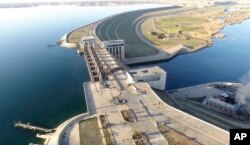After suspending an offensive to assess the safety of Syria's largest dam, U.S.-backed Kurdish fighters said Tuesday they are poised to resume operations against Islamic State extremists who had occupied the massive structure.
Ahmed Mohamed, a spokesman in the so-called Syrian Democratic Forces, told VOA that Kurdish engineers found no evidence to back an IS claim on social media on Sunday that the four-kilometer-wide hydroelectric dam was at risk of collapse from rising waters and recent U.S-led coalition airstrikes.
"A team of engineers have inspected the dam and proved that these claims are not true," he said. "These claims are used by IS to stop our advancement in the area. We are now controlling two kilometers of the dam and will continue with a new strategy starting from tomorrow."
The Tabqa dam is located on the Euphrates River, about 40 kilometers upstream from Islamic State's de facto capital at Raqqa. Until IS was recently pushed out, extremists had controlled the facility and a nearby airbase since 2014.
Risk of massive flooding
The United Nations has warned that a collapse of the dam would likely cause massive flooding in Raqqa and farther downstream at Deir Ezzor, about 150 kilometers from the Iraq border.
Reuters reported on Tuesday that Syrian engineers were working to clear spillways and ease pressure on the Euphrates River where its waters flow toward the dam. However, the U.S.-led coalition said a day earlier that the integrity of the structure appears secure.
"To our knowledge, the dam has not been structurally damaged," the coalition said in a statement on Twitter.
An official in the Syrian government who spoke under condition of anonymity told VOA on Tuesday that it would be difficult to destroy the dam entirely, even after recent battles and bombardments.
"I talked to a team of engineers who used to manage the dam before IS's takeover, and all have agreed that the largest dam in the country is very fortified," the Syrian official said. "The only way for the dam to collapse is if IS planted explosive materials in its body."
'Dam is safe'
Ilham Ahmed, co-president of the Democratic Council of Syria — the political front of the SDF — told VOA that IS is spreading false statements about the dam to arouse public fears.
"The SDF generals are paying close attention to the dam, and to any suspicious activities taken by IS to explode the dam, which is not going to happen," she said. "The dam is important and it used to generate power to many parts of Syria. ... We have the capabilities and the experts that can run the dam and make it functional."
Russia, which helped construct the dam during the Soviet era in the 1970s, accused the U.S.-led coalition on Tuesday of trying to ruin crucial Syrian infrastructure, including the dam.
Colonel-General Sergei Rudskoi of the Russian army general staff said the coalition. was trying to "completely destroy critical infrastructure in Syria and complicate post-war reconstruction as much as possible."













